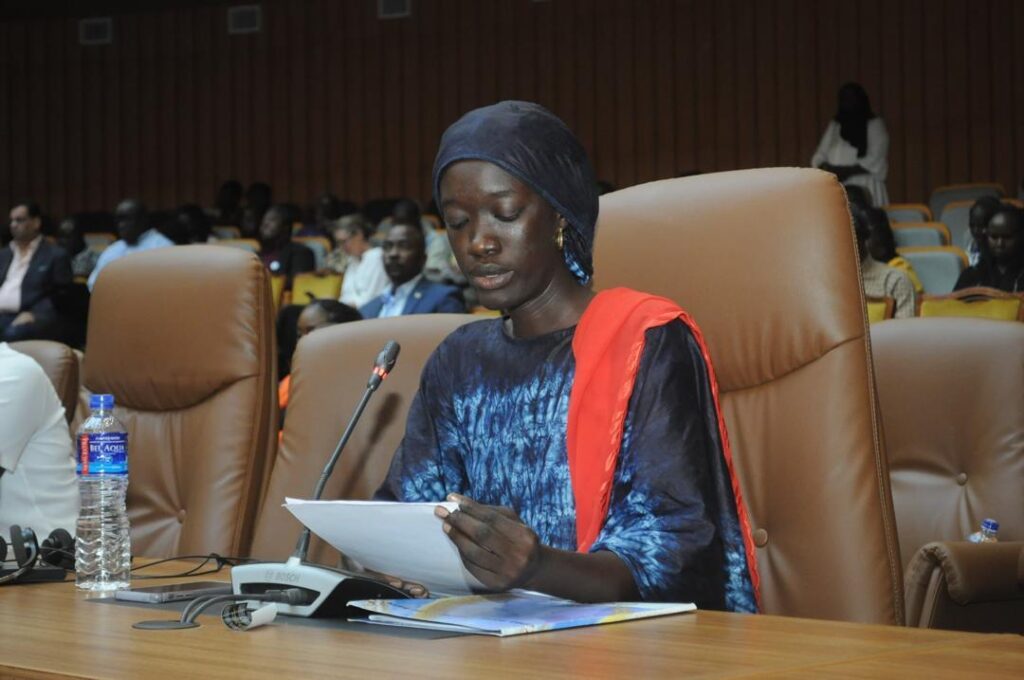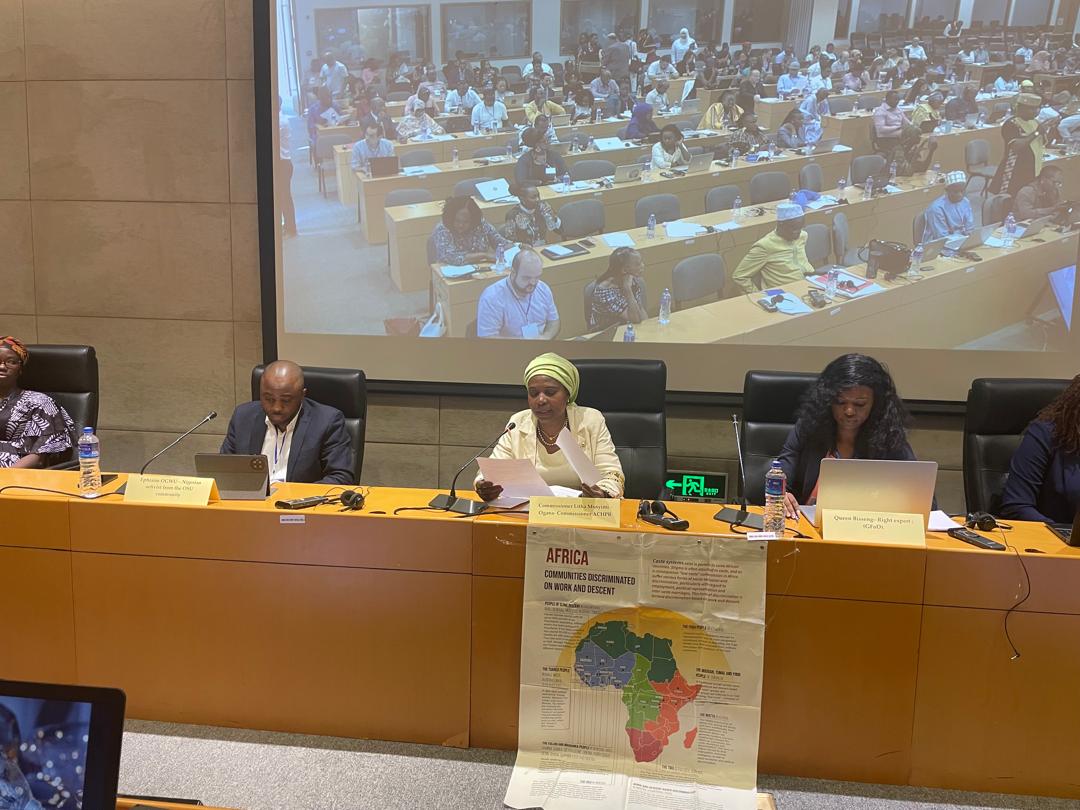A seismic moment: ACHPR adopts resolution on Africa CDWD
In a significant milestone for the rights of Communities Discriminated on Work and Descent (CDWD), the African Commission on Human and Peoples' Rights (ACHPR) has adopted a landmark resolution focused on the protection and promotion of these communities' rights in Africa.
This resolution was passed as one of eight thematic resolutions during the 81st Public Ordinary Session of the Commission, held in Banjul, Republic of The Gambia, from October 17 to November 6, 2024.
This step marks an important recognition of the struggles faced by communities affected by descent- and work-based discrimination, underscoring a deeper commitment to safeguarding their human rights.
The 81st session saw powerful testimonies delivered by CDWD leaders and activists, highlighting the hardships faced by the community.

Queen Bisseng, the Africa Coordinator for GFoD, called it a truly historic moment. “This moment brings a renewed sense of hope and validation to communities across Africa who have endured generations of systemic exclusion and hardship. However, we recognize that this milestone marks not an endpoint, but the beginning of a new phase in our journey; a struggle to ensure these resolutions are implemented and domesticated within national frameworks for the full and meaningful protection of these communities who have been left furthest behind.
The real impact of this achievement will be felt only through strong, inclusive actions and dedicated efforts at all levels. Governments, civil society, and local leaders must work together to create an environment where the rights of communities discriminated on work and descent are fully recognized, safeguarded, and uplifted,” she added.
The CDWD movement has gained tremendous momentum thanks to the unwavering support from Hon'ble Commissioner Litha Musyimi and the African Commission on Human and Peoples' Rights (ACHPR). Additionally, Lawyers Without Borders has been instrumental in providing extensive assistance across Africa. The extensive support of Ibrahima Kane has also been pivotal in advancing the CDWD movement's mission and goals.
A strong representation of CDWD
Halimatou Ceesay, a rights expert for the Global Forum of Communities Discriminated on Work and Descent (GFoD) in The Gambia, played an important role in bringing the issue to light at the African Commission for Human and Peoples' Rights. “In The Gambia, communities continue to endure caste-based discrimination that mirrors the institutionalized slavery of our past. These communities remain voiceless and largely neglected by the state, even as their children are being denied basic rights, including education,” she said.
Similarly, GFoD senior rights expert Alima Taal delivered a powerful statement addressing a pressing concern in African societies. Alima highlighted the caste systems ingrained within various ethnic groups across the continent, including the caste structures within ethnic communities in The Gambia, the Tuareg caste system in western Niger and Mali, and the Osu caste system in Nigeria. She further brought attention to the discrimination faced by the Haratins in Mauritania and the Mbororos in Cameroon.

“Our unwavering commitment to human rights and the principles enshrined in the African Charter on Human and Peoples' Rights compels us to take an unyielding stance against any form of discrimination, including those deeply rooted in work and descent. The inherent values of justice, equality, and human dignity that our continent aspires to uphold stand as a testament to our shared vision for a more inclusive and equitable society,” she added.
Ahead of the 81st Session of the African Commission on Human and Peoples' Rights (ACHPR), held from October 13 to 15, 2024, we also saw significant discussions on the challenges faced by communities discriminated against based on employment and descent.
The NGO Forum brought together a special interest group comprising key human rights defenders from across the continent, including participants from Mali, Burkina Faso, Cameroon, Gambia, Nigeria, and North Africa. Their collective focus was on addressing entrenched discrimination based on work and descent and marginalization affecting millions in Africa.
Extensive representation, immense diversity
The 81st Public Ordinary Session, convened in accordance with Article 64 (2) of the African Charter on Human and Peoples' Rights (the African Charter) and Rule 27 of the Commission's Rules of Procedure (2020), began with an opening ceremony on October 17, 2024. The ceremony was hosted at the Sir Dawda Kairaba Jawara International Conference Centre and presided over by Honourable Dawda A. Jallow, Attorney General and Minister of Justice of The Gambia, alongside Honourable Commissioner Rémy Ngoy Lumbu, Chairperson of the Commission. Commissioner Lumbu also chaired the proceedings, with assistance from Vice-Chairperson Honourable Commissioner Janet Ramatoulie Sallah-Njie.
The session saw robust participation, with a total of 631 attendees comprising diverse stakeholders. This included 122 representatives from 28 State Parties, 11 representatives from African Union (AU) organs, and 2 representatives from Regional Economic Communities.
Additionally, 27 delegates from international and intergovernmental organizations and 45 representatives from National Human Rights Institutions (NHRIs) participated. The session was also attended by 372 representatives from African and international non-governmental organizations (NGOs), 12 members of the press, and 40 officers from the Commission Secretariat.
Statements on the human rights situation were delivered by representatives from 15 African countries, including Algeria, Angola, Burkina Faso, Cameroon, the Democratic Republic of Congo, Egypt, Eritrea, Eswatini, Lesotho, Mauritania, South Africa, Tunisia, Rwanda, Uganda, and Zimbabwe. Furthermore, six NHRIs with affiliate status to the Commission provided updates on human rights conditions in their respective nations. These institutions included the National Human Rights Commissions of South Africa, Burkina Faso, Burundi, Cameroon, Ethiopia, and Malawi. The Network of African National Human Rights Institutions also made a collective statement addressing the human rights landscape in Africa.
The session facilitated active NGO involvement, with 87 organizations that hold Observer Status contributing statements. Moreover, several states, including Egypt, Eritrea, Eswatini, Lesotho, the Democratic Republic of Congo, Tunisia, Uganda, and Zimbabwe, utilized their right of reply to address human rights concerns.
The session also highlighted the importance of education as part of its commemorative activities for African Human Rights Day, which was observed on October 21, 2024. The event, themed “Educate an African fit for the 21st century,” included a Joint Colloquium organized by the Commission and its partners to discuss economic, social, and cultural rights, with a particular emphasis on the right to education.
Concluding the session, the Commission announced an upcoming Extraordinary Session set to take place in Dakar, Senegal, from December 2 to 6, 2024. Additionally, plans for the 82nd Private Ordinary Session were outlined, and scheduled (virtually) from February 25 to March 11, 2025. The closing ceremony on November 6, 2024, marked the end of a session that furthered the commitment to promoting and protecting human rights, with a particular focus on marginalized and discriminated communities.


